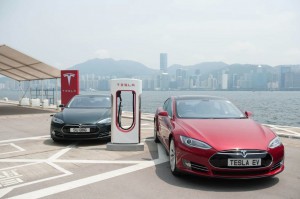
Good news for Tesla and other EV makers in China as the government has extended incentives on electric vehicles.
The Chinese government appears to have extended the hefty incentives that helped ignite the rapid sales of electric vehicles in China, according to Bruce Belzowski, managing director of the automotive futures program at the University of Michigan Transportation Research Institute.
Belzowski said during a UMTRI-sponsored conference on “Marketing New Powertrain Technologies,” said the Chinese government is prepared to go great lengths to promote the development of electric vehicles.
While the Chinese now build millions of internal combustion engines every year, the government has concluded that the global automakers Japan, the United States and Western Europe have a major edge built around 100 years of experience, he noted.
“They’re pushing for battery power because it’s a way to build the technological capability,” Belzowski said. “It becomes a center of expertise for the Chinese,” he said. BYD, one of China’s top makers of electric vehicles, already builds electric busses that are used around the world, he noted.
(China posts meager auto sales gain in 2017. Click Herefor the story.)
Meanwhile, the market share of electric vehicles has doubled inside China in 2017 and is poised to expand dramatically in the next few years as manufacturers add more new models to their product portfolio and the charging infrastructure expands.
Belzowski added the incentives for electric vehicle offered by the Chinese central government were due to expire at the end of 2017. However, they have now been extended and the Chinese are now tinkering with them so that vehicles with a greater range and carrying capacity are likely to get larger subsidies in the foreseeable future.
An even more important factor in the growth of the electric vehicle market in China is the licensing system, which is controlled by the local governments in major cities such as Beijing or Guangzhou. In many places in China, the only way to get a license plate for a vehicle is through a lottery system or at an auction, Belzowski noted.
However, consumers who purchase a “New Energy Vehicle” are given a license plate. The licensing system is having and will continue to have a major impact on consumer behavior.
(Click Here for details about China banning production of 553 models.)
With Chinese policy tilting more toward battery electric vehicles, plug-in hybrid electric vehicles that combine both batteries and internal combustion engine are unlikely to gain much of a following, experts at the UMTRI conference said.
Xavier Mosquet of the Boston Consulting Group said buyers of PHEV’s rarely charge the vehicle’s batteries and rely instead on the conventional internal combustion engines with which the vehicles are equipped.
Manufacturers, however, gain credits for building them under the existing rules but regulators in China and the European Union are increasingly skeptical about the benefits of PHEVs and are likely to eliminate regulations that have prompted automakers to put them on the market, Mosquet said.
Belzowski and Mosquet also agreed that widespread use of electric vehicles in China won’t have much impact on China’s overall emissions of carbon dioxide. However, they will help to reduce the pollution in some cities.
(To see more about China trying to add AI to 50% of vehicles by 2020, Click Here.)
In the United States, one the other, hand where demand for electricity has peaked, electric utilities will undoubtedly welcome the coming of electric vehicles, Mosquet observed.

